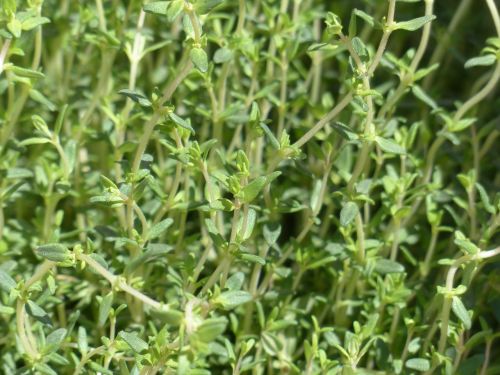Thyme, known scientifically as Thymus vulgaris, is a versatile herb belonging to the mint family, Lamiaceae. Prized for its potent aroma and flavor, thyme has a rich history of use in culinary, medicinal, and ornamental applications. This article explores the intricacies of thyme, including its various types, uses, health benefits, and cultivation techniques.
Types of Thyme
While there are around 350 species of thyme, the following are the most commonly recognized and used:
- Common Thyme (Thymus vulgaris): This variety is often used in cooking for its strong, earthy flavor. It’s also the primary source of thyme essential oil.
- Lemon Thyme (Thymus citriodorus): This type of thyme is known for its distinctive lemon scent. It’s used in culinary applications and as an ornamental plant in gardens.
- Creeping Thyme (Thymus serpyllum): Creeping thyme is primarily used as a ground cover in landscaping. It’s also known for its beautiful purple flowers.
Culinary Uses of Thyme
Thyme’s robust flavor profile makes it a staple in many types of cuisine. In French cooking, it’s an essential ingredient in the herb blend Herbes de Provence. It’s also often combined with marjoram, parsley, and other herbs to create bouquet garni, a bundle of herbs used to flavor soups and stews.
Thyme pairs well with a variety of foods, including poultry, red meat, fish, and vegetables. It can be used fresh or dried, though the flavor intensifies when it’s dried.
Health Benefits of Thyme
Beyond its culinary uses, thyme also offers a host of health benefits:
- Antioxidant Properties: Thyme is packed with antioxidants, including thymol, carvacrol, and flavonoids, which can protect your cells from oxidative damage.
- Anti-inflammatory Properties: Some studies suggest that thyme can help reduce inflammation in the body, which may offer potential benefits for conditions like arthritis.
- Antimicrobial Properties: Thyme has been used for its antimicrobial properties since ancient times, and modern research supports its effectiveness against a variety of bacteria and fungi.
- Respiratory Health: Thyme tea is a traditional remedy for coughs and respiratory ailments, and some scientific evidence supports this use.
Growing Thyme
Thyme is a hardy plant that prefers full sun and well-drained soil. It can tolerate drought and poor soil conditions, making it an excellent choice for rock gardens or areas with low rainfall. Thyme can be propagated from seeds, cuttings, or division.
Thyme plants can also be grown indoors with enough sunlight and proper care. Overwatering can lead to root rot, so it’s essential to ensure the plant’s soil drains well.
Thyme is an exceptionally versatile herb, enhancing our lives through its culinary, health, and ornamental uses. Whether you’re a gourmet chef, a health enthusiast, or a gardening hobbyist, thyme’s timeless appeal is sure to captivate you. Its rich aroma, diverse benefits, and easy-growing nature make it a treasured staple in both the kitchen and the garden.
